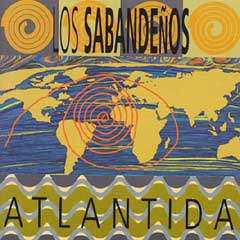Los Sabandeños are so famous on the Canary Islands, that already seven lanes and streets on the seven islands bear the name of the band.
 Atlantida has been album no. 39 since Los Sabandeños got together in 1970. 28 Tinerfenos form the centre of the band: architects, taxi drivers, carpenters, doctors, and many other professions. The mayor of La Laguna himself is the bandleader: Elfidio Alonso, panderata-player, composer, writer of lyrics, and - years ago - already author of a series of 10 LPs plus detailed booklets, documenting the music of the Canary Islands.
Atlantida has been album no. 39 since Los Sabandeños got together in 1970. 28 Tinerfenos form the centre of the band: architects, taxi drivers, carpenters, doctors, and many other professions. The mayor of La Laguna himself is the bandleader: Elfidio Alonso, panderata-player, composer, writer of lyrics, and - years ago - already author of a series of 10 LPs plus detailed booklets, documenting the music of the Canary Islands.
In 1966, the brothers Sebastian and Manuel Ramos had a small folk band in Punta de Hidalgo /Tenerife, performing their Malaguenas, Isas and Folias at smaller festivities. Then, the stars of the Canary Islands popular music were Nestor Alamo, Mary Sanchez, Olga Ramos or Totoyo Millares, a Timple-virtuoso. However, people in Punta de Hidalgo were thinking about how to create a new Canarian music not getting out of touch with the traditional music.
This was the time when - under the influence of the protest songs of Dylan, Seeger, and Joan Baez - young people in Latin America had rediscovered their traditional folk music, often linked with new, contemporary, critical lyrics in the Nuevas Canciones (Chile), or Nueva Trova (Cuba), thus offering an important contribution to the daily politics and uniting musically heart and mind of anti-dictatorian, anti-fascist or just left-wing movements. In Tenerife, a first record with four songs had such tremendous success that soon additional singers and musicians joined in. Together with Quique Martin, Elfidio Alonso was leading the band of the Finca of Sabanda: Los Sabandeños.
Soon, their fame was spreading over the borders of Tenerife when they started to do what their colleagues in Chile, Argentina or Brazil did: digging out what had long been forgotten in Canarian music, thus corresponding to the common movement of the Canarian people to discover and express their independence.
Almost simultaneously, a second legendary band in new Canarian music got together on the island of La Palma: Taburiente (CD Taburiente - A Tierra also on Tropical Music), whose arrangements of traditional music showed a stronger relation to Jazz, Rock, and Fusion.
Already 4 years later, Los Sabandeños were breaking up: 12 members, one of them Julio Fajardo, left the band and under the sole guidance of Alonso concert and record productions were made which are very much respected even today, represented by Seguidillhas del Salinero (Songs of the salt workers) and Cantata del Mencey Loco, highlighting our CD Atlantida in a new arrangement.
Los Sabandeños have been exemplary for many other bands on all seven islands, using the concept that worked so well on Tenerife and adapting it to their own regions. Meanwhile, already seven lanes and streets on the seven Canary Islands bear the name Los Sabandeños.
Atlantis
Atlantis is not only that mythological continent, supposed to have disappeared completely or partially in the Atlantic Ocean, between the Canary Islands, the Azores, or Cap Verde, maybe. Los Sabandeños used the name for their new album, designed as another attempt to honour this myth already mentioned by Platon in his dialogues Kritias and Timaios. This attempt is strongly supported directly or allegorically by songs like Cantata of Crazy Mencey, songs with Canarian background or the wonderful song Mar Azul by Cesaria Evora (Cape Verde). A poem called Atlantis was written by the Catalan poet Jacinto Verdaguer - a fragment of which is recorded on Atlantida in Spanish.
But - from the antiques until modern times - Atlantis has also stood for the myth of the birth of the Atlantic Ocean, of the creation of the Blue Sea and the Sinister Sea, representing the big exit i.e. the Sea of Emigration for the Canarians and many other people as well. The songs of Los Sabandeños on their latest recording stand for the second meaning of the Atlantis myth : Uruguay, Venezuela, Cuba, Argentina and Brazil; the ship on which Jacinto Vera's parents were travelling when he was born right on the Atlantic Ocean.
More info on Los Sabandeños - Atlantida
